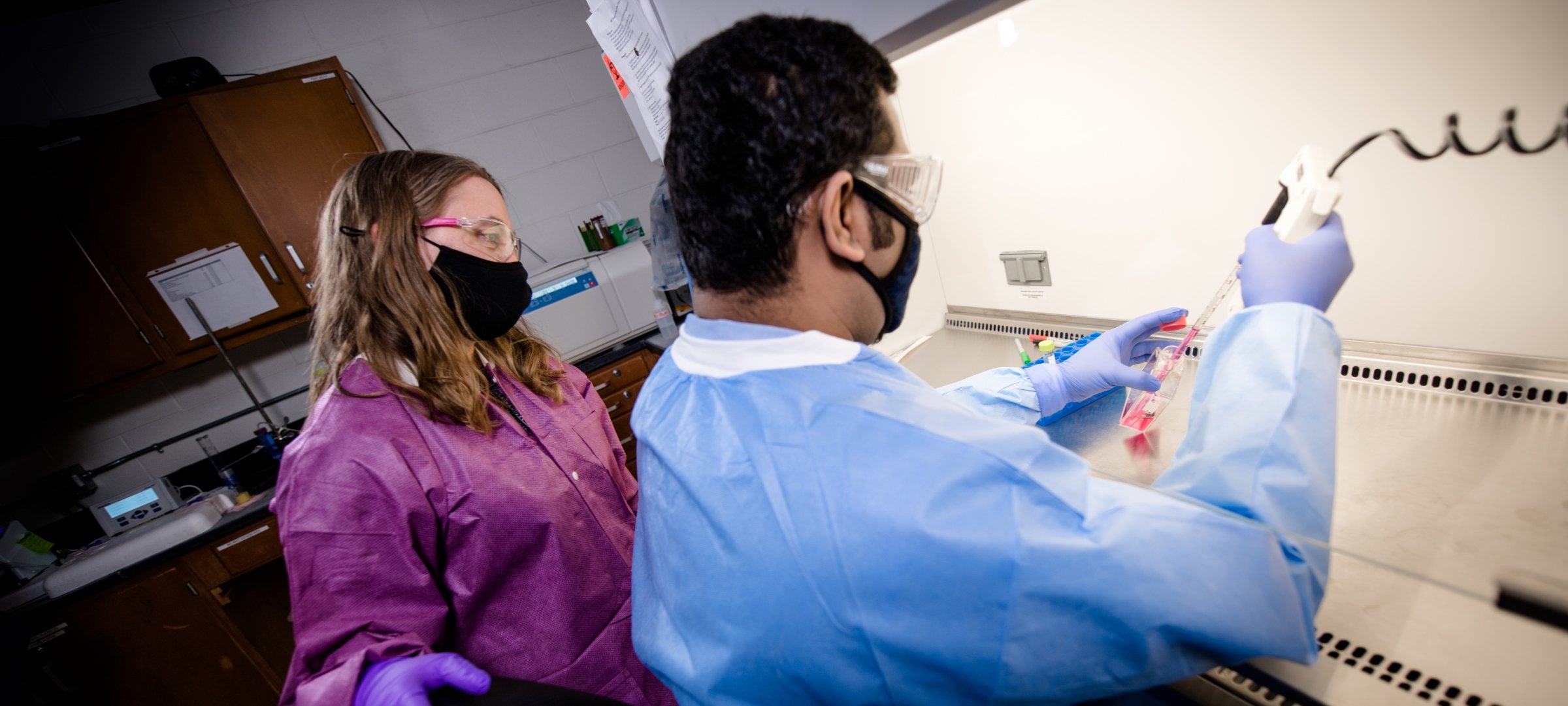Chemical engineering is a broad and versatile discipline of engineering, which involves applying basic sciences and engineering principles in order to develop, design, operate and maintain processes that convert raw materials to useful products.
Chemical engineering is a broad, versatile branch of engineering that involves the use of math, chemistry, biology, physics, and other natural sciences to bring about molecular transformations. Chemical engineers make sure the water we drink is safe, help to generate the electricity that powers the world, produce medications that keep us healthy, and find solutions when processes need to be fixed or improved in manufacturing and other industries.
Chemical engineers apply basic science and engineering principles to benefit humankind, including creating products like vaccines, antibiotics, fertilizers, and detergents. Chemical engineering is also very concerned with a sustainable world and environmental protection, evolving to answer the needs of the planet. The field emphasizes a do-no-harm approach focused on environmentally benign manufacturing and sustainable development.
Chemical engineers have led the development of biomedicine and biotechnology. Chemical engineering is crucial to the materials revolution, especially in computer chip manufacturing, nanotechnology, and plastics and fibers.
Chemical engineering also remains essential to providing for the ongoing and growing energy needs of the world. Chemical engineers are responsible for the development of gasoline and other fuels. This branch of engineering originated with applications of chemistry—combined with the principles of physics and mathematics—used to separate crude oil into products. Since then, chemical engineering has become one of the most universal and important fields of engineering, leading to careers in biotechnology, pharmaceuticals, energy, chemicals, nanotechnology, semiconductors, engineered materials, consumer products, sustainability, and environmental stewardship.
Most recently, chemical engineering has evolved to integrate knowledge of biological processes that allows chemical engineers to focus on molecular-level solutions to issues and problems ranging from environmental challenges to medical breakthroughs.

What Do Chemical Engineers Do?
Chemical engineers solve problems using a strong foundation of science, engineering, and mathematics. They take on global and societal challenges in climate, environment, and clean water, finding ways to use resources efficiently and sustainably to improve quality of life in ways that are friendly to both the environment and the economy.
Chemical engineers have been improving our well-being for more than a century by developing products and technologies that touch every aspect of our lives—from smaller, faster computer chips to innovations in recycling, treatments for disease and other medical conditions, treating waste, and generating energy.
Studying chemical engineering prepares students for a wide variety of careers. They can be plant engineers, corporate executives, professors, inventors, lawyers, researchers, or physicians. They can specialize in sales, operations, management, or leadership in industries including oil, chemical, biomedical, pharmaceutical, microelectronics, environmental, pulp and paper, food, textile, fertilizer, fragrance, and automotive. They have careers in government, academia, banks, and brokerages. They can conceive, develop, and market successful products. They can also develop sustainable services and are highly valued for their skills in process improvement.

What Careers are there in Chemical Engineering?
Chemical engineering touches everything. The list of products impacted by chemical engineers is endless and ever-growing. Knowing what industries employ chemical engineers can help you understand the scope of possible careers. Chemical engineers work in manufacturing, pharmaceuticals, healthcare, design and construction, pulp and paper, petrochemicals, food processing, mineral processing, specialty chemicals, microelectronics, electronic and advanced materials, polymers, business services, biotechnology, and environmental health and safety industries, among others.
Chemical engineers play a crucial role in making the world run better. They contribute to society by solving pressing problems related to health, energy, and the environment. The goal of chemical engineering is to take a process and improve it—by making it faster, with a higher yield, less waste, and less intense energy needs. Because of the wide range of industries that depend on the synthesis and processing of chemicals and materials, chemical engineers are always in high demand.
Emerging technologies that rely on chemical engineering include biofuels and alternative energy, rechargeable batteries for electric vehicles (EVs), hydrogen fuel cells, engineered materials, drugs and vaccine development, and nanotechnology.
A bachelor's degree in chemical engineering is all you need for a career in a wide variety of industries. However, earning a bachelor's degree in chemical engineering also opens the doors to pursue graduate degrees—your master's or PhD—that can take you farther in other up-and-coming fields. In addition to an advanced degree in chemical engineering, chemical engineers moving beyond a bachelor's degree pursue advanced degrees in biomedical engineering, materials science and engineering, environmental engineering, and data science. Chemical engineers also go on to leverage their bachelor's degree by successfully pursuing professional degrees in business, law, and medical school.

What Skills Do Chemical Engineers Need?
Students who enjoy and excel at chemistry, math, and problem-solving do well in chemical engineering. Chemical engineers rely on their critical thinking skills wherever they're choosing to apply their expertise: in manufacturing, environment-focused industries, or in the areas of climate, sustainability, law, education, publishing, finance, and medicine.
Chemical engineers are also trained to understand how corporate decisions are governed by business considerations, including return on investment (ROI) and discounted cash flow (DCF). They think about how those economic factors come into play while prioritizing the welfare and safety of communities. Other highly valued skills that chemical engineering graduates can put to effective use are sensitivity to societal needs and how they vary around the globe; knowing how to access and understand local laws and the many layers of environmental regulations; and being aware of how community concerns and stakeholder buy-in can be integral to a project. The skills chemical engineers put to use in these situations, like written and oral communication, the ability to work in groups and on teams, being a motivated self-starter, and exhibiting a willingness to lead, can be acquired through both degree coursework and extracurricular activities. They are beneficial to both projects and to chemical engineers seeking career advancement.
A strong grounding in mathematics provides chemical engineers with the skills required to lead informed decision-making. They're well-equipped to explore quantitative aspects of options and technologies. Chemical engineers also rely on cutting-edge computational tools for process design and simulation, data analysis/mining, and process and product design.
Where Do Chemical Engineers Work?
Chemical engineers put their knowledge to use in many different industries. They might work in an office setting, in laboratories, or in the field. Examples of places where chemical engineers work include:
- Companies that make specialty chemicals, fuels, plastics, fibers or fertilizer
- Companies that make microelectronics, like semiconductors
- Companies that manufacture vaccines
- Companies that create better building materials
- Companies that engineer new pharmaceuticals or other healthcare products
- Companies that ensure clean drinking water through desalination or other treatment processes
What Tasks Do Chemical Engineers Do?
Some examples of what chemical engineers can do at these companies include:
- Translating a process from its development in a research lab test tube to a full commercial-scale production intended for major markets
- Figuring out how to eliminate waste at a manufacturing plant
- Working with a process glitch to improve efficiency and energy use
- Deploying process engineering and optimization
- Troubleshooting day-to-day operations
- Improving process reliability
- Finding ways to better meet customer needs
- Creating products designed to unique customer specifications
Unit operations are one of the most fascinating and specialized aspects of chemical engineering. Processes can include chemical cleaning, thermal oxidation, plasma etching, chemical vapor deposition, spin coating, ion sputtering, lithography, and more. Others specific to superconductor fabrication might minimize defects and increase yield. In fabrication processes, chemical engineers often use statistical quality control tools to minimize product variations.
Chemical engineers who are interested in the pharmaceutical industry will take elective courses in biochemistry and microbiology. They may work for a biotechnology company that utilizes recombinant DNA and genetic engineering to develop a new class of drugs and therapeutics.
Going on to professional degree programs after completing a bachelor's degree offers many other career options and expands what chemical engineers can do. Some chemical engineering graduates go to medical school, law school, or earn an MBA (master's in business administration). Chemical engineers have a good track record of getting admitted to medical school. That's because of their strong background in chemistry and their ability to engage in bio-related research in their chemical engineering undergraduate program. Other chemical engineering degree holders will apply to graduate school and pursue a research-focused career.
There are a lot of benefits to being a chemical engineer. They are well paid, can be recognized and appreciated within both their industry and society, and they have the opportunity to work with the processes of nature to meet the needs of humankind and the planet.

How Much Do Chemical Engineers Earn?
The median entry-level annual salary for a chemical engineering graduate with less than one year of experience is $73,837, according to Payscale. The mean annual salary is $128,430, according to the Bureau of Labor Statistics, which also reports that the top 10 percent in the chemical engineering field earn $182,150 annually.
Job prospects are good, with an above-average growth rate of 10 percent in the next decade.
| Mean Entry-Level Salary (Payscale) | Mean Annual Salary (BLS) | Top 10 Percent (BLS) | |
|---|---|---|---|
| $73,837 | $128,430 | $182,150 | |
|
Figures from payscale.com, accessed April 2025. Figures from U.S. Bureau of Labor Statistics (BLS), dated May 2024. |
|||
See additional engineering salary information.
The History and Future of Chemical Engineering
Chemical engineering built the world's energy and saved millions of lives with the production of penicillin. The field continues to be a beacon for a better tomorrow since evolving in the US as a discipline at the turn of the last century.
Along with commercial-scale production of antibiotics, early chemical engineering applications in the first half of the 20th century occurred in the manufacturing of heavy chemicals: sulfuric acid, synthetic ammonia, fertilizers, petrochemicals, synthetic polymers, fibers, and rubber.
The second half of the 20th century ushered in the production of fissionable isotopes (nuclear energy); information technology products (microelectronics, semiconductors, storage devices, ultraclean environments); artificial organ and biomedical devices; food processing; and development of new energy sources. This time period also saw several new fields emerge, at least in part, as an outgrowth of chemical engineering, including petroleum engineering, systems engineering, materials science and engineering, biomedical engineering, and environmental engineering.
The evolution of chemical engineering continues with applications in the field of biotechnology, healthcare, and numerous innovations designed to improve our quality of life.
During the next two decades, chemical engineering will play a central role in solving problems to meet global challenges in the fields of clean energy (renewable biofuels, fuel cells, rechargeable batteries), environment and sustainability (clean air, carbon footprint reduction, energy-efficient manufacturing, sustainable chemistry), health and medicine (cancer therapeutics, drugs and vaccines, safe drinking water, an artificial pancreas, artificial kidney, kidney dialysis), and more. Chemical engineering and chemical engineers have the power to make the world a better place.
Pursuing a Chemical Engineering Degree
There are many paths you can take to a career in a chemical engineering profession. Most entry-level positions require at least a bachelor's degree in a related field. Undergraduate academic advisors including Brooke Forseth say there are many ways you can prepare yourself to pursue your degree in a chemical engineering:
Tips for High School Students
If you're currently in high school and are considering chemical engineering, you can:
- Make an appointment with your high school advisor or another trusted source of career advice, like a pre-college outreach program, so you can get the most current material and advice they have available.
- Focus on taking all the math and science courses your school offers. In addition to algebra, geometry, calculus, trigonometry, chemistry, physics, and biology, computer sciences courses can also be super helpful.
- Take Advanced Placement (AP) courses in math and science, if they are available to you.
- Seek out workshops, events, and summer youth camp experiences offered by universities or other institutions that will give you a taste of what it would be like to be a chemical engineer.
- Attend career-focused events at your school that offer insights into different professions, including engineering or chemical engineering.
Choosing a College or University for Chemical Engineering
Finding a school to study chemical engineering where you can set yourself up for success—and that you feel would be a good fit for you in general—takes research and patience. But it can be done, and there are lots of resources to help. Here are some ways to make your decision easier:
- Research colleges and universities that are accredited by ABET, the Accreditation Board for Engineering and Technology Inc. That way, you know you will earn a degree that will pay off with excellent career opportunities.
- Contact the schools you're interested in and ask lots of questions about programs, scholarships, and financial aid opportunities, as well as application requirements and deadlines. If you visit the school website for that program, you will find ways to request more information and get in touch via email or phone.
- Visit the schools you're most interested in. Many students say that a visit makes the decision much easier because you can see the campus, talk to faculty and staff, and experience what it would be like for you to be there as a student. If it's not possible to visit, see if the schools you're interested in offer a virtual campus tour.
Apply to the schools you think are the right fit for you and your goals sometime between your junior year and the beginning of your senior year. It's important to apply before those deadlines!
Tips for College Students
If you're already a college student, you can use these tips from our College of Engineering advisor to make your studies go more smoothly and help you become a chemical engineer:
- Meet regularly with your academic advisor to make sure you've chosen the appropriate courses to give you the necessary knowledge and skills for a career in chemical engineering.
- Get experience working on real-life projects. You can find opportunities through student organizations, professional conferences, co-ops and internships, and research projects at your institution.
- Go to office hours, ask questions, and form relationships with faculty members in your program. These connections are a huge plus for getting relevant experience while you're in school, including participating in research projects, and the connections can benefit you throughout your professional or academic career.
- Use the learning centers available to you on campus. Many colleges have them. You can work with student mentors and others who have studied chemical engineering and know how to help you succeed. Pro Tip: Don't wait until you're in trouble with grades or assignments. It's easier to do well in school if you locate resources and get used to accessing them right away.
- Network with professionals. There are many opportunities. You can attend conferences you learn about through your on-campus chapter of professional groups, like the American Institute of Chemical Engineers (AIChE) or Omega Chi Epsilon, the national honor society for chemical engineering students. You can attend a career fair—don't wait for your senior year to get comfortable at this event! Career fairs are about more than getting hired. Every chance to connect with professionals in your field is valuable. You never know when who you will meet will come in handy!
- Keep your resume up to date and practice your interviewing skills through your career center or with other students.
